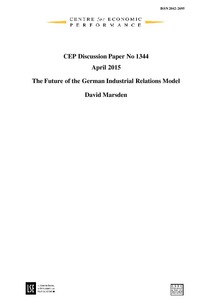The future of the German industrial relations model
"The paper examines recent evidence on the erosion of the German industrial relations model. Although its coverage has declined, much of this has occurred in smaller and newer establishments, and compared with Britain, it has remained solid in the areas of Germany's traditional industrial...
| Main Author: | |
|---|---|
| Institution: | ETUI-European Trade Union Institute |
| Format: | TEXT |
| Language: | English |
| Published: |
London
2015
LSE |
| Subjects: | |
| Online Access: | https://www.labourline.org/KENTIKA-19113372124919315549-The-future-of-the-German-indus.htm |
| Summary: | "The paper examines recent evidence on the erosion of the German industrial relations model. Although its coverage has declined, much of this has occurred in smaller and newer establishments, and compared with Britain, it has remained solid in the areas of Germany's traditional industrial strength. This is explained by the nature of high performance work systems that involve flexible working and on-the-job problem-solving. Both countries have modernised their work systems in recent decades, with German industrial firms maintaining higher degrees of worker autonomy and learning and British ones relying more on managerial control. The survival of the German model in this sector, as compared with services, is attributed to the role of such work systems in the high end of international competition. A model is developed to explain why stable cooperation within these work relationships is enhanced by means of a strong institutional framework. It is then used to explain why employers in the sectors using these systems have continued to work within these institutions. It is argued that employers’ increased focus on the match between commercial needs and workplace institutions has contributed to the growing segmentation within German industrial relations which has been widely documented, and represents a departure from the classical post-war German model. The article finishes by asking how far this can go before damaging social and political cohesion." |
|---|---|
| Physical Description: | 29 p. Digital |

